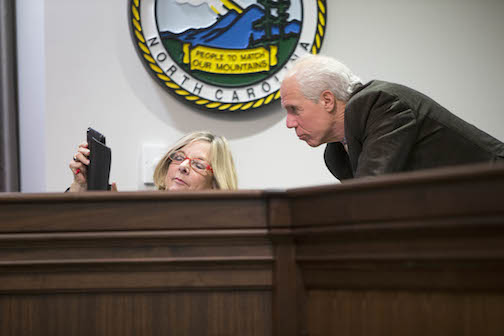Vice Chair Ellen Frost consults with Buncombe County Attorney Bob Deutsch. Photo by Alicia Funderburk
It wasn’t quite a toxic argument, but Buncombe County Commissioners fiercely debated a resolution extolling the virtues of green cleaning Feb. 18.
Pushed by Vice Chair Ellen Frost, the measure urges county staff to “incorporate environmental considerations into purchasing decisions” using guiding principals developed by the Environmental Protection Agency. Noting that some cleaning chemicals can be toxic to workers’ health, Frost said the measure will help ensure “we won’t see people having to wear masks when they clean.”
The “Resolution Regarding Use of Non-Toxic Cleaners,” which she helped draft, states: “Choosing less hazardous products that have positive environmental attributes (biodegradability, low toxicity, low volatile organic compound (VOC) content, reduced packaging, low life cycle energy use) and taking steps to reduce exposure can minimize harmful impacts to custodial workers and building occupants.”
However, Commissioner Mike Fryar worried that so-called green cleaning products might not be powerful enough to keep county facilities sanitary. He likened the concern to his own battle with cancer, noting that “it takes something strong to kill this bacteria that’s in me — it is a poison.” He added: “It takes Clorox to get green stuff off the side of my house.”
Frost brushed aside his concerns, noting that “some of the major hospitals in the country have gone green.” And Commissioner Brownie Newman noted that there’s no language in the resolution requiring staff or contractors to use products that don’t work well. “It’s not a mandate. … It doesn’t tie hands,” he said. “We want to use the most environmental products we can while still getting the job done.”
Meanwhile, Fryar’s Republican colleagues on the board, Commissioners David King and Joe Belcher, also stood opposed — at least initially. King said he worried about the measure hampering proper cleaning, especially in the county’s maintenance department, where they deal with heavy equipment. And Belcher argued that the status quo was working just fine. “The requirements that they’re under now are pretty strict. What we’re doing now is pretty good,” he said.
But seeking their votes, Commissioner Holly Jones asked, “How can we make it palatable?”
To assuage King, Belcher and Fryar’s concerns, county Attorney Bob Deutsch suggested amending the language to specifically state that nothing in the resolution would prohibit county staff from using cleaning materials necessary to do the tasks required of them. It was enough for King, who then voted in support.
But despite the amendment, Fryar and Belcher held firm in opposition. “It’s still fluff and buff any way you want to look at it,” asserted Fryar. “This is just something … that we don’t need to be wasting our time on.”
In the end, the measure passed 5-2.
“I feel like this is just caring about people having a healthier work experience,” said Jones. “I don’t think it’s fluff. I think it’s an important step for caring about people.”
Hot button issues delayed; ban on tethering on the way?
A pair of hot-button issues originally scheduled for Feb. 18 were delayed.
Moogfest’s request for $90,000 in incentives was rescheduled for March 4 so that company President Mike Adams, who was out of town, could attend the deliberations. And a controversial rezoning request to allow a major new mixed use development in Riceville was withdrawn by the company in order to give it time to make some changes to its plans.
Instead, the commissioners unanimously approved tweaks to the county’s zoning ordinance concerning small residential lot sizes and the setbacks between new buildings and public utilities. The new rules aim to encourage infill development and affordable housing construction, said Josh O’Conner, county zoning administrator.
In other business, several animal health advocates urged the commissioners to consider a county ban on tethering dogs. Dogs on tethers are more likely to become aggressive and bite people, said Patrick Irwin, president of ChainFree Asheville. The organization pushed the city to pass a similar measure in 2009 that outlaws the tethering of unattended dogs.
In response, Frost, who works in the animal care business as the owner of Bed & Biscuit, instructed staff to work with the Buncombe County Sheriff Department to research drafting such rules.






Before you comment
The comments section is here to provide a platform for civil dialogue on the issues we face together as a local community. Xpress is committed to offering this platform for all voices, but when the tone of the discussion gets nasty or strays off topic, we believe many people choose not to participate. Xpress editors are determined to moderate comments to ensure a constructive interchange is maintained. All comments judged not to be in keeping with the spirit of civil discourse will be removed and repeat violators will be banned. See here for our terms of service. Thank you for being part of this effort to promote respectful discussion.